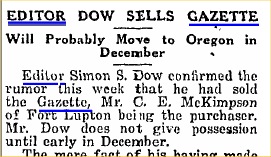 Rattler
November 1916
Rattler
November 1916Robert Porter McKimson was one of the principal creators of the Warner
Bros. cartoons, first as the studio's most imposing animator and then as a
long-tenured director. Such enduring characters as Foghorn Leghorn and the
Tasmanian Devil first appeared in his cartoons, and he was critically important
in the development of Bugs Bunny.
Bob McKimson was born in Denver, Colorado, on October 13, 1910. In
autobiographical notes written in 1944, when he was promoted from animator to
director, he said that his "schooling consisted of a start in a small country
schoolhouse - which contained eight elementary grades in one large room, then on
through five years in a small town called Wray, Colorado, where my father owned
the weekly newspaper." The McKimson family moved briefly to Los Angeles in 1921,
then back to Colorado, and then to Texas, buying and operating a newspaper in
each place. Finally, in 1926, McKimson's parents sold their newspaper in
Canadian, Texas, a Panhandle town, and moved back to Los Angeles, this time for
good.
"My father taught my two brothers and myself the newspaper and printing business
from the ground up," McKimson wrote in 1944. "My mother, being an artist, taught
each of us everything she knew about drawing from the time we could hold a
pencil. Before coming to California my only artistic endeavors were newspaper
cartoons, drawings etc. for state and county fairs, and drawing anything and
everything for my own pleasure."
Thomas Jacob "Tom" McKimson (March 5, 1907 - February 14, 1998) was an American
animator, best known for his work at Warner Bros. studio. He was the older
brother of animators Robert and Charles McKimson.
McKimson was born in Denver, Colorado, but relocated to Los Angeles with his
family in the 1920s. He began his career in animation in 1928, when he joined
the Walt Disney Studio, becoming an assistant to animator Norman Ferguson. He
left Disney in the early 1930s to work briefly for Romer Grey Studios, then
joined Harman-Ising Studios around 1932. After Harman and Ising left Warner
Bros. Animation for MGM, McKimson became a member of Bob Clampett's animation
unit, where he is credited with the original design for Tweety Bird. McKimson
also provided animation for Bob McKimson and Arthur Davis's units.
During his time at Warner Bros., McKimson also worked for Dell Comics, providing
illustrations for the Bugs Bunny and Road Runner comic books. McKimson also
illustrated the Roy Rogers daily comic strip from 1949 to 1953 in collaboration
with his brother Charles and artist Pete Alvarado, using the collective
pseudonym "Al McKimson."[1][2] He left Warners in 1947 to become art director
for Dell's parent company Western Publishing, where he remained until his
retirement in 1972.
Robert McKimson's relatively early death probably robbed him of much of the fame
that he deserved. No figure at Warner Brothers -- not Avery, not Clampett, not
Jones, not even Freleng -- racked up the kind of service that Bob McKimson did.
He joined the studio in 1930. His first screen credit is for Bosko's Store in
1932, and he would continue to be in the credits continuously until the close of
the studio in 1963.
McKimson had an extremely rare combination of talents that made him a formidable
animator: his art was stylish, and he worked extremely fast. First Avery's unit,
later Jones' took advantage of his exquisite draftsmanship, which had few rivals
at Warners -- indeed, anywhere outside of Disney. It was, however, in the
Clampett unit, to which McKimson moved around 1942, that he reached his peak as
an animator. It is no coincidence that Clampett started being able to fully
achieve his manic vision at this point, having such a talented top animator
working with him.
It was McKimson who made the key model sheets for Bugs Bunny in October 1942 and
in 1943. These played a pivotal role in shaping the definitive Bugs. He also
drew the famous publicity pose of Bugs with a carrot, leaning on a tree,
originally drawn for an Easter display at a Los Angeles department store.
Brother Charles entered into the animation field in 1937 with Warner Bros. and
animated for Tex Avery. His first screen credit was in 1939, "Land of the
Midnight Fun." He remained there until 1941 when he was drafted into the U.S.
Army Signal Corps. He animated training films for the Army until his release in
1946.
Meanwhile, Tom rejoined Robert at Warner Bros. in 1942 doing animation and
layouts for Bob Clampett. He remained with Warners until 1947 when he joined
Whitman/Dell Publishing as Art Director for comic books, coloring books and
comic strips. He eventually became overall Art Director and retired in 1972.
However, he remained active doing comic books and animation until his passing in
1998. Tom was one of the great talents in the history of comic book art. I
believe his accomplishments and place in animation art is well established.
Tom McKimson is probably referred to in the brief appearance of a taxicab
labeled "Tom's Taxi" in The Great Piggy Bank Robbery (Clampett, 1946).
Charles rejoined Warners in 1946 and became an animator for brother Robert, and
stayed until 1954. He then joined brother Tom at Whitman/Dell Publishing and
became Art Director for comic and coloring books. He remained there until 1963,
and left to start his own animation company, doing TV and motion picture titles
and commercials, which were released through Pacific Title. Charles closed that
business in 1994, but remained active with McKimson Productions doing animation
art projects. His ability to create animated TV and motion picture titles was
much sought after by the studios. Along the way, he earned two "Emmy" awards for
his titles, which further honored his artistic and technical ability. He passed
away in April 1999.
Charles E "Charley" McKimson Sr
Birth 17 Jan 1872 in Union County, Iowa , Death Oct 1972 in Beloit, Mitchell,
Kansas
In 1900 Charles is in Glen Elder, Mitchell County, Kansas, boarding with a
day-laborer's family. He's a printer.
Mildred Porter's parents - Annabel Knowles married Thomas N. Porter, and in 1900 are in Fort Lupton, Thomas 42, Annabel 37, Mildred 15, and Muriel J. 1.
They're buried in Fort Lupton - Anabel 1861-1936 # 57258084, and Thomas N. 1857-1931.
In 1905 Charles and Mildred were in Denver County - they're in the "Lot and Block Index"
Thomas Jacob was born in Denver County March 5, 1907
Anabel, also in Denver County, January 2, 1909
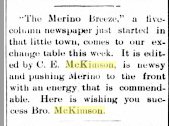
In 1910 they were in Merino, Logan County, Colorado, with children Thomas and Anabel. Chas. E. is editor of a newspaper.
Looks like they didn't stay long - the 1911 Merino
business directory has Merino Breeze (w), Thad S Sutton ed.
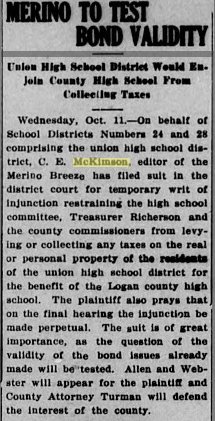
 Rattler
November 1916
Rattler
November 1916
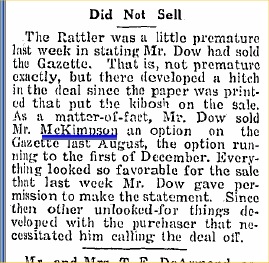 Buying a newspaper wasn't simple, even in 1916
Buying a newspaper wasn't simple, even in 1916
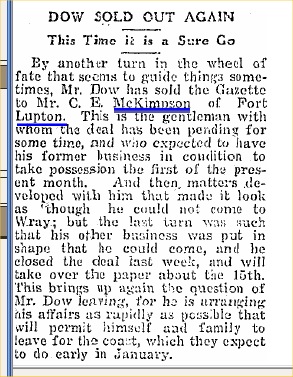 Rattler
December 1916
Rattler
December 1916
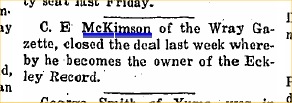 September 1917 He owned it in 1918, as well as the Gazette, per the
History of Colorado
September 1917 He owned it in 1918, as well as the Gazette, per the
History of Colorado
In 1917 Thomas J. McKimpson was in the fifth grade at Wray with Miss Breckenridge, teacher
Anabel McKimspson is in the third grade with Miss Donna Wittemeyer
Robert McKimson is in the third grade with Myrtle Humbersone
YES THAT'S HOW THEY WERE SPELLED IN THE RATTLER
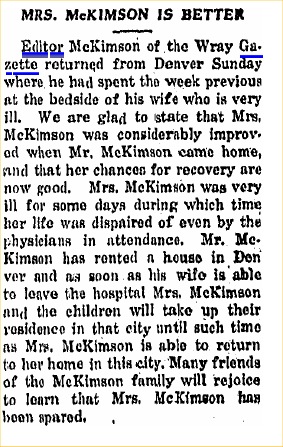 Rattler
December 1919
Rattler
December 1919
The 1920 census has the McKimson family living on South Coyote Street (now called Clay Street) in Wray, with the three sons and daughters Anabel and Alice.
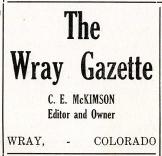 Advertisement in the 1920 Yuma County Atlas
Advertisement in the 1920 Yuma County Atlas
A 1922 Rattler article said that F.W. Elliott was working in the Akron Reporter newspaper, and that he had worked for McKimson at the Gazette in Wray for several years. Elliott was "a likeable chap and a valued employee." The 1920 census has Floyd W. Elliott lodging with the Jesse Holloway family on Kiowa Street. Floyd is 16, an apprentice printer, born in Iowa.. If he's the Floyd Elliott working at a gas station in Omaha in 1930, he didn't stay in Colorado long.
Likely he's the Floyd Wesley Elliott born July 23, 1903 in Jasper County Iowa to Chas. R. and Eldora (Phipps) Elliott, dying June 11, 1995 in San Joaquin County, California.
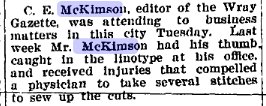
The McKimson's were in Wray in April 1921, if the Red Cloud (Nebraska) article on their visit is correct.
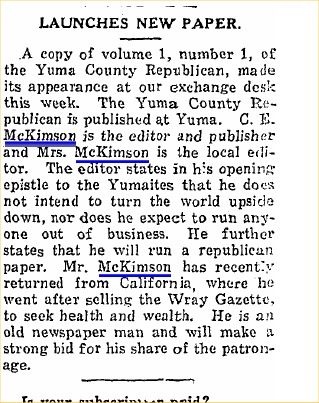 January
1922
January
1922
With his older brother graduating from the eighth grade in April 1922 in Yuma, it's almost certain that Robert attended school there.
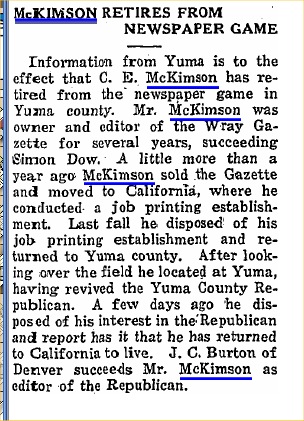 June
1922
June
1922
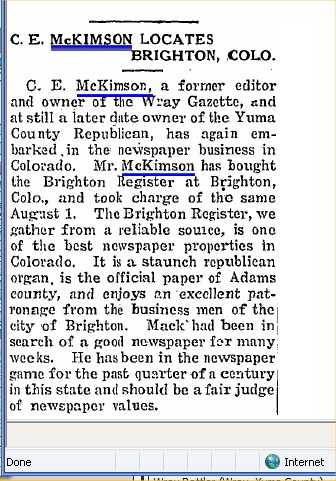 Rattler
August 1922
Rattler
August 1922
C.E. McKimson is in the 1922 fall telephone directory for Greeley, living at 49 S 3rd av, Brighton
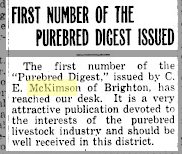
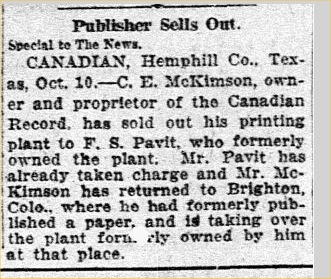 This
October 1925 deal must have not been completed (Dallas Morning News)
This
October 1925 deal must have not been completed (Dallas Morning News)
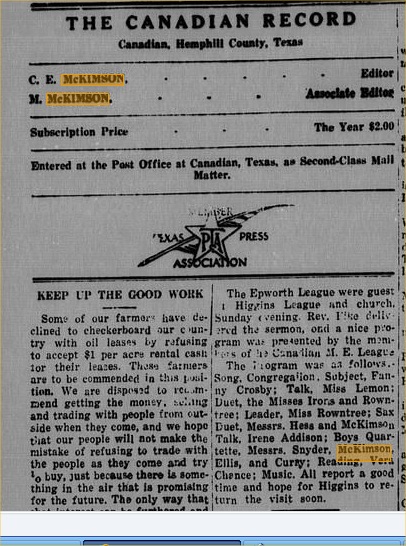 March 1926
March 1926
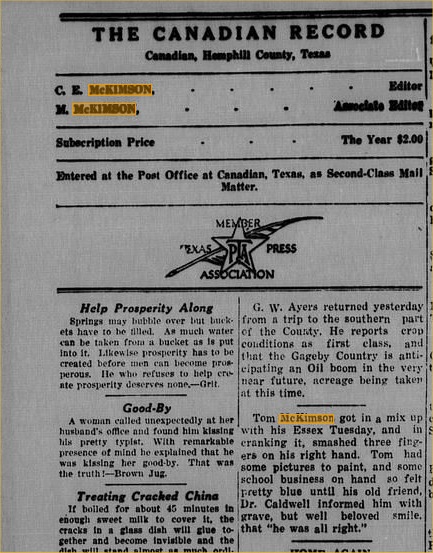 And April 1926
And April 1926
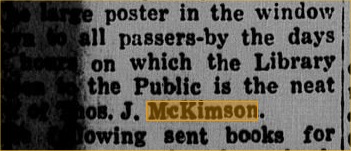 Also
April 1926 - This is Thomas
Also
April 1926 - This is Thomas
That's about when this photo of Bob was taken - Thanks to his son Robert Jr.
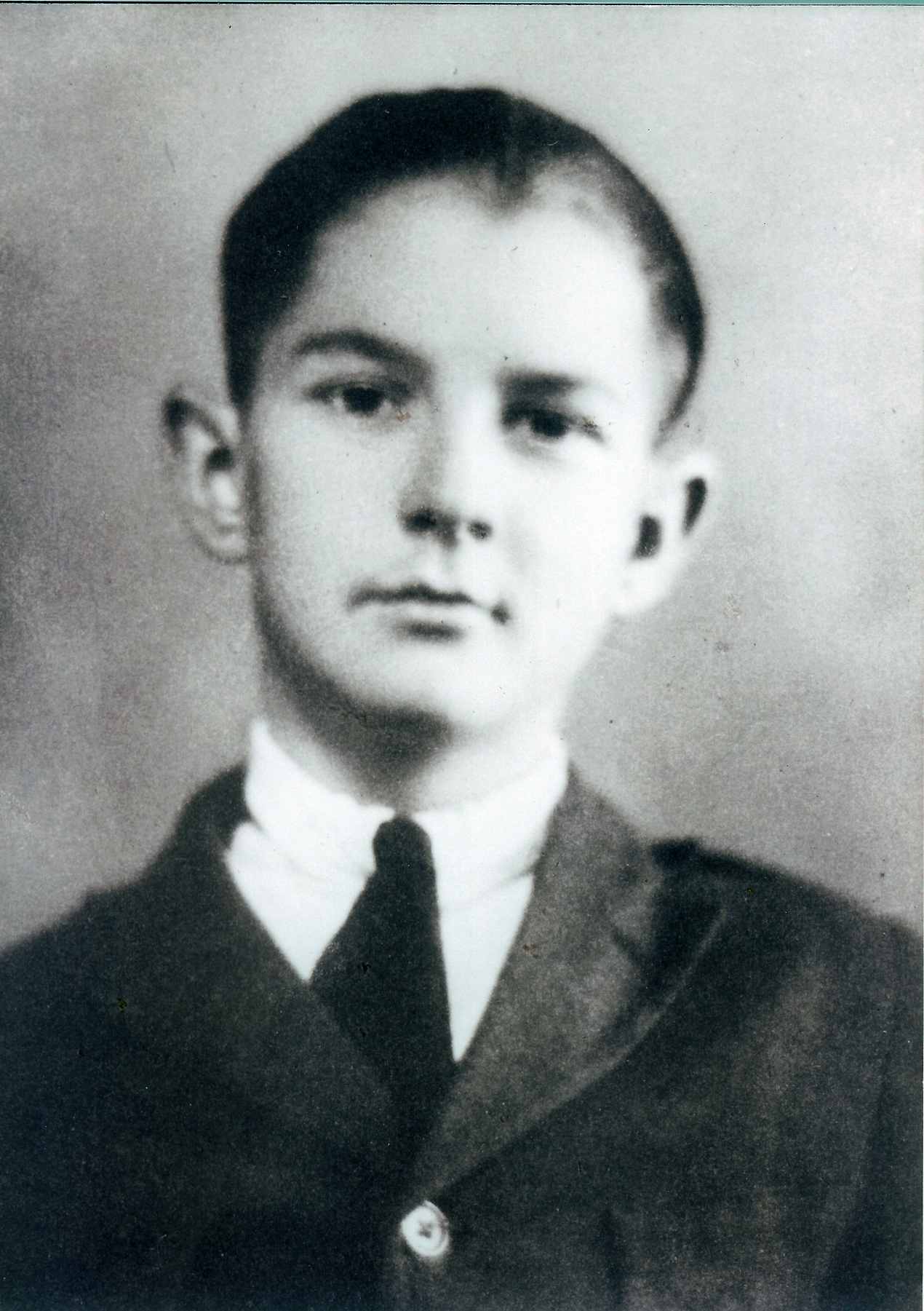
This is Tom - and almost exactly the time period when he was graduating from the eighth grade in Yuma. Also from Robert McKimson, Jr.
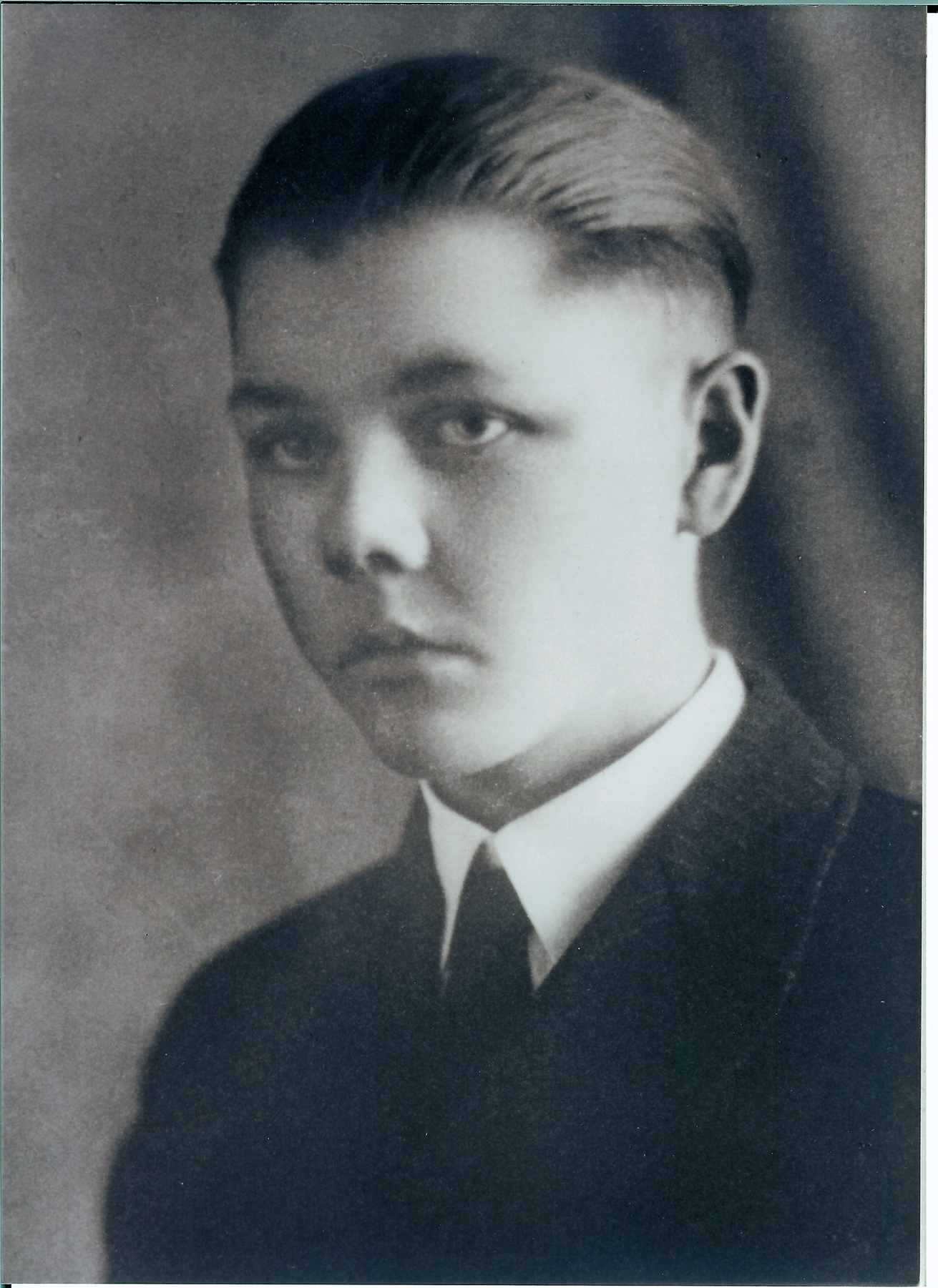
This is "Chuck" - Charles, Jr. - also from Robert McKimson, Jr.
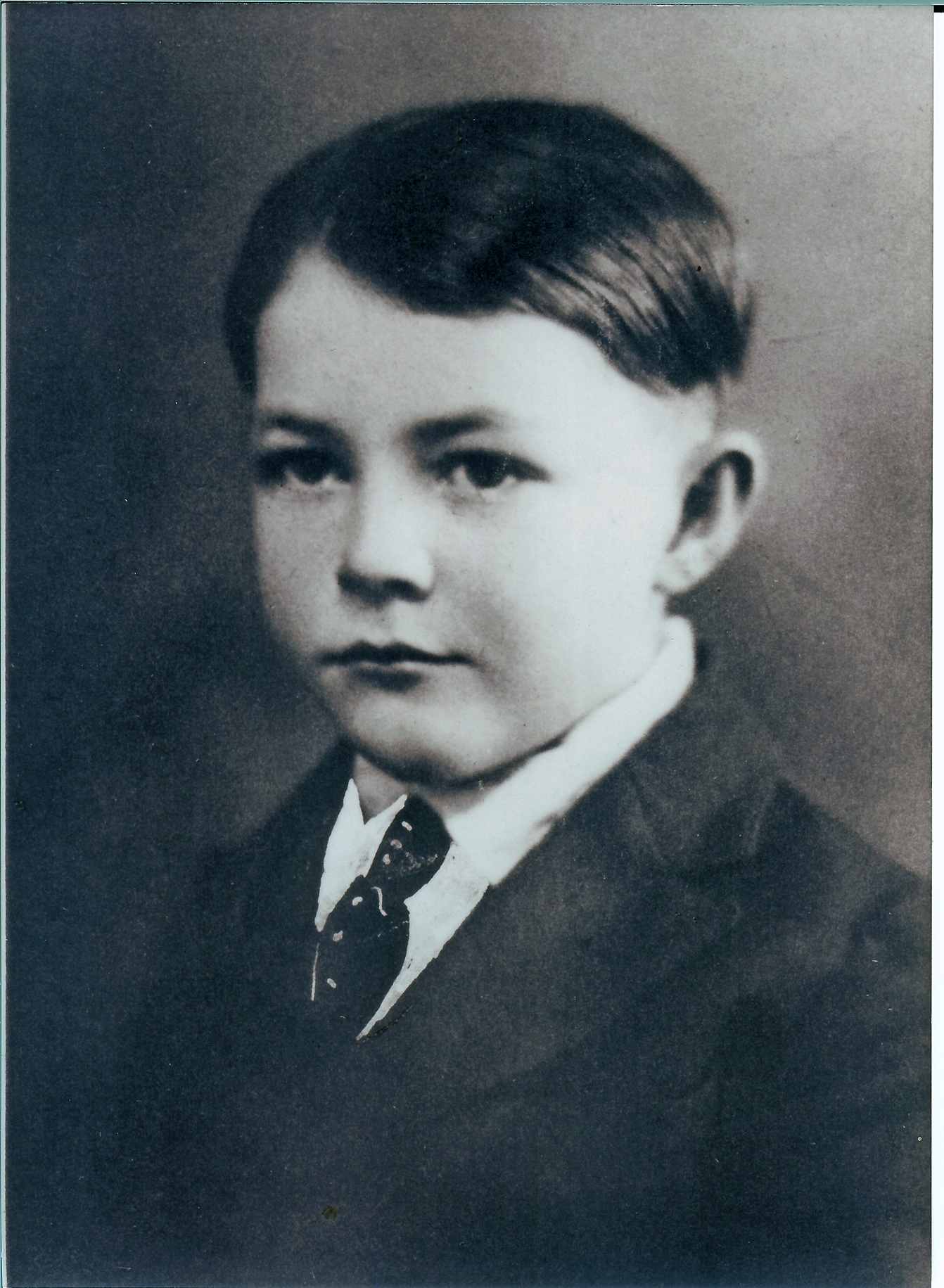
In 1926 they had sold the Record - and Mrs. C.E. McKimson was the note-holder of record, according to an October 1926 article.
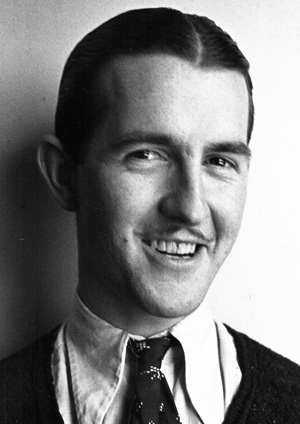 Robert McKimson early 1930's
Robert McKimson early 1930's
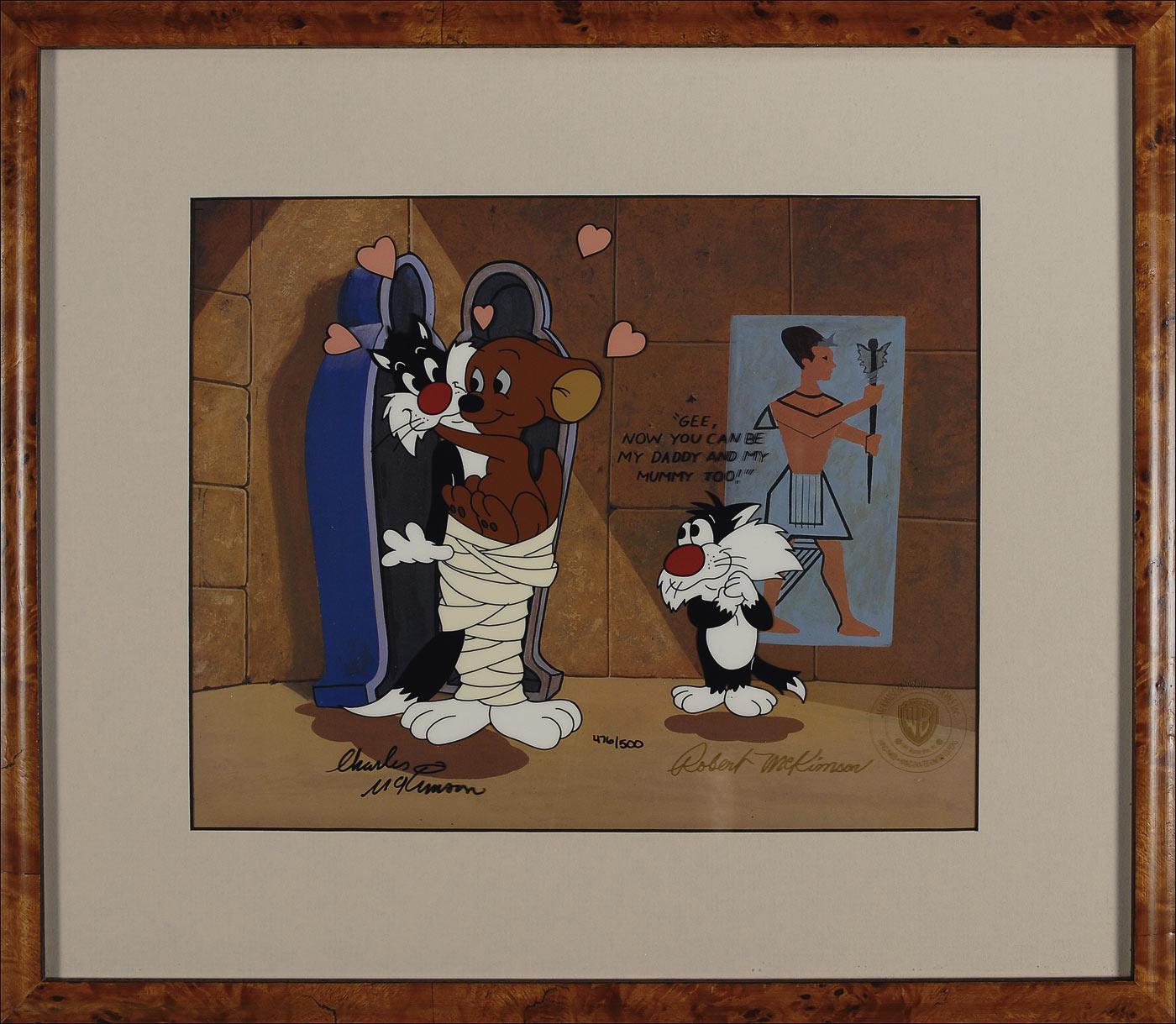 Note the two signatures on this cel !
Note the two signatures on this cel !
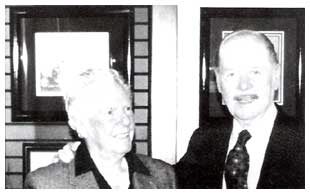 Tom and Charles McKimson
Tom and Charles McKimson
CHARLEY MCKIMSON
Wray, Colorado - June 18, 1925
"Ever since he left Brighton for Texas the Patriot has
not known the where abouts of C. E. McKimson and family,
but this week by the courtesy of Guy Richards we find that
they arc located at Canadian, Texas, where Mac is putting
out a fine paper known far and near as The Canadian Record.
We are glad to again get the
former Wray people located and it will not be our fault
if they go and lose themselves."
September 30, 1934
"Former friends of Miss Anabel McKimson, daughter of Mr. and Mrs. C. E. McKimson of Hollywood, Calif., received announcements this week of her recent marriage to Mr. Walter R. Weickert on Saturday, September 10. The McKimson family lived In Wray for several years when Mr. McKimson was editor of the Gazette and they still have many friends in this locality."
May 14, 1936
"C. E. McKimson, owner and publisher of the Wray Gazette
from 1917 to 1921, passed through Wray last Monday and stopped
at The Rattler office for a brief visit.
Mrs. McKimson who was associated with her husband in the
newspaper business here, passed away last March, at
the age of 62 years. The McKimson family has resided in
Los Angeles in recent years where Mr. McKimson is engaged
in the newspaper business. Mr. McKimson was enroute to
Los Angeles from a visit to his old home in Iowa."
May 5, 1938 "Relatives who came to Wray from a distance
to attend the funeral of Paul Lasher are
Mr. and Mrs. John Cruse of Worland, Wyo.,
Mrs. Hershel Browner, Wheatland, Wyo.,
Mrs. Hazel Zimmerman, Casper, Wyo.,
Mrs. James Harding, Mr. and Mrs. Francis Zimmerman,
and Mr. and Mrs. Ray Zimmerman, all of Denver;
Mr. and Mrs. Lester Heitman and Ronald of Fort Lupton,
Mrs. Blackbum, Mr. and Mrs. Ed Mclntire and family of Sterling,
Jerry Brethower of Imperial, Neb.,
and Mr. and Mrs. Henderson and daughter Frieda of Greeley,
Mr. and Mrs. S. E. Stiles, Mr. and Mrs. Robert McKimson,
and Elmer Struck of Fort Lupton."
August 15, 1940 "This editor enjoyed a visit last Sunday
morning with a former Wray newspaper man,
the person of C. E. McKimson. Mr. McKimson was a competitor
of this editor away back in 1919 and 1920. McKimson edited
and owned the Wray Gazette. He left here in 1921.
Mrs. McKimson died some years ago and Mr. McKimson
married another lady a short time ago and she was with
him on his visit to Wray Sunday morning.
The McKimson children have now grown to manhood and
womanhood and they are all living in California.
Mr. McKimson is now the editor and owner of the newspaper
at Scandia, Kansas. Mr. McKimson inquired about many of
the older citizens of the town. He was amazed at the
improvements that have been made in Wray in the past
20 years. Indeed he could not associate the town he
remembered as Wray with the town he visited last
Sunday morning after an absence of 20 years.
When C. E. McKimson lived in Wray he was this
editor's competitor for several years but he was
nevertheless a good friend. Our business relations
were always pleasant. It was a pleasure to renew
his acquaintance last Sunday morning."
May 1, 1941
"From time to time several of our readers have asked us
"what has happened to C. E. McKimson who used to run this paper?"
Until this time we have been unable to answer this question,
and now only because he has gained a bit of favorable
publicity in the Publishers Auxiliary, a national newspaper
for editors. McKimson was in Wray, editor of the GAZETTE at
the time of the height of the Wray oil activity boom
(the first one) and many will remember him and his family.
After leaving Wray he published the Merino Breeze at Merino,
Colorado, and the Brighton Republican at Brighton,
Colorado, and from there he drifted to the state of
California and his activities there have not been recorded
as far as we can ascertain. McKimson is now
(once a newspaperman - always a newspaperman)
publishing a paper at Scandia, Kans., a town of about
700 located on highway No. 36 in about the middle
of the state. There he has the Scandia Journal,
and is apparently doing well. Of all the syndicated
news and cartoon services, McKimson has the most
unique. His son Thomas, the eldest and who attended
school here, is an artist and is an animator for
M-G-M Studios in Hollywood. Whenever
Editor McKimson wants a cartoon for the paper all
he has to do is write to the boy and his cartoon
is forthcoming. We do hope that this explanation
of McKimson will satisfy those readers who have
been inquiring about their former editor."
August 29, 1946 "When you see the popular "Bugs Bunny"
cartoons at the theatre you may like to know that a former
Wray boy has a hand in the creation of this movie comic
strip. Bob McKimson, whose parents, the C. E. McKimsons,
were former publishers of The Wray Gazette, stopped here
briefly last Thursday to take a look at the town where
he spent much of his boyhood and to visit The Gazette.
He is on vacation from Warner Bros studio in Hollywood,
McKimson says he formerly was a cartoonist and helped
create the Bugs Bunny character. Now he is a director
of the series. He was on his way to Beloit, Kansas,
to visit his father and will return to Hollywood from
there."
September 1951
"Mr. and Mrs. C. E. McKimson, former publishers of The Gazette, spent Friday night of last week in Wray. They left Wray in 1921 and now publish a newspaper at Beloit, Kan."
(from Weekly Beloit Call)
Charley Edson McKimson was born in Afton, Iowa, January 17, 1872, to Jacob and
Nancy Porter McKimson and died October 30, 1972 at the Mitchell County hospital
at the age of 100 years, 9 months; and 13 days.
He moved to Kansas in 1887, settling on a farm north of Solomon Rapids. In 1896
he left for Denver, Colo. where he learned the printing trade which he followed
for 50 years. He owned newspapers in Colorado, Texas, California and Kansas, his
last being the SCANDIA JOURNAL in Scandia, Kansas.
He was married in Denver to Mildred Porter in 1905. To this union 5 children
were born. They later moved to California.
After his wife's death in 1936, he returned to Kansas and renewed acquaintance
with an old school-mate, Lena Thierolf, to whom he was married in 1940.
After disposing of the Scandia Journal, investments were made in Jewell County
land in which he had a keen interest, but retirement was in their home in
Beloit.
He was a member of the Methodist church Methodist Men's Brotherhood, and took
part in all Church activities.
Besides his wife, Lena, he is survived by 2 daughters, Mrs. Alyce Bryson,
Woodland Hills, Calif.; Mrs. Anabel Weikert, Newbury Park, Calif., three sons,
Thomas J., Pacific-Palisades, Calif.; Robert P., Beverly Hills, Calif. and
Charles E., Jr. Guadlajara, Mexico. Also, 8 grandchildren, 8 great
grandchildren, other relatives and many friends.
Mr. McKimson bought the Scandia Journal from the Stofer Bros., taking over
November 14 with his first issue Nov. 17, 1938. He wrote that he and his wife
had been in the newspaper business for 31 years and when she died he decided to
"quit the business forever" and after 2 1/2 years happened to come to Scandia
when the printer's ink began to draw him to newspaper shops and he bought the
Journal. Cap Berger, who already had a job elsewhere, was persuaded by McKimson
to stay here as linotype operator. McKimson sold the shop to Cap in 1946.
Tom, his son, is a cartoonist and the Journal during the days of McKimson and
Cap, had the advantage of his artistic skill.
A Thanksgiving drawing was made when Tom was "ten or eleven", and graced the
second issue of the Journal under McKimson's editorship.
This week's moonlighting Golden Age animator touches upon the extensive career of Bob's eldest brother, Tom McKimson! Born in 1907 in Denver, Colorado, Tom McKimson, along with his brothers Bob and Charles, acquired an artistic background from his mother Mildred, and a robust business ethic from his father Charles Sr. As children. The McKimson brothers worked various duties for their father's newspaper and printing business, from feeding presses to linotype work. Tom drew illustrations-which could range from political or local events- as required. After the McKimson family moved to Los Angeles in 1926, McKimson entered UCLA to attend a commercial arts program. He was soon disappointed with their fine arts curriculum, and transferred to the Otis Art Institute, where he took life drawing and painting courses, among others. Tom gained skill as an illustrator before he went to work in animation. He and Bob McKimson illustrated a proposed children's book, Mouse Tales, written by their mother, from 1927 to 1928. The surviving drawings of the book from Tom McKimson, in particular, appear similar to the later Disney and Harman-Ising house style before those studios established them in the early '30s. Tom worked at Walt Disney's studio, while attending classes at night; eventually, he left Otis and became an assistant to Norm Ferguson, while Bob worked under Dick Lundy. After they left Disney's, they worked together at the ultra-obscure Telefilm Studios. An issue of Hollywood Filmograph, dated March 15, 1930, displayed an advertisement for "Monkey Bizness Sound Cartoons." The advertisement, along with an illustration of the accompanying film (The Bull-Slinger) gives credit to Bob and Tom McKimson for the animation. Little is known about the film, and no documentation seems to survive. In the spring of 1930, Romer Grey-son of author Zane Grey-opened an animation studio, offering a better salary than Disney. The two brothers served as a guide for the young, inexperienced new animators as they worked on a series of cartoons featuring Binko the Bear Cub. Four cartoons were animated, with only two ready to be made into duplicate prints. (The sole surviving Binko film, Hot Toe Mollie, is available now on Tom Stathes' Cartoon Roots DVD/Blu-Ray set.) Romer Grey faced difficulties with a distribution deal and income for his animators, so the studio folded in the summer of 1931. The two went to Warners, where they worked under Hugh Harman and Rudy Ising. When Harman and Ising split from producer Leon Schlesinger in 1933, Bob stayed at Warners, while Tom left to work with them, as they picked up two Cubby Bear cartoons (Cubby Bear's World Flight and The Gay Gaucho) from the Van Beuren Corporation in New York. In between Harman and Ising's search for a new distributor, he went back to Disney for a brief period, animating on Silly Symphonies such as The Night Before Christmas (1933) and The Grasshopper and the Ants (1934). In February 1934, Harman and Ising signed a contract with MGM and McKimson soon joined their staff. McKimson was a prolific animator. An October 1934 memo from Harman-Ising's business manager Gordon Wilson to Ising reveals that McKimson was animating thirty-nine feet a week. Harman and Ising filed for bankruptcy in the summer of 1938, in effect joining the staff of MGM's newly established animation studio. McKimson moved to Cartoon Films, Ltd., formerly Ub Iwerks' studio, which specialized in animated theatrical commercials. Cartoon Films, Ltd. also produced a few titles distributed by Columbia Pictures, which can be seen here. Around 1942, McKimson went back to Warners, in Bob Clampett's unit, working alongside his brother Bob-the head animator at the studio during this period. He animated on several films, drew various character model sheets, and served as a layout and background artist for Clampett. In 1944, McKimson went into freelance work for Western Publishing on the Looney Tunes & Merrie Melodies Comics, published by Dell. He mainly drew, inked and lettered the featured Bugs Bunny stories, where he made slight adjustments to Bob McKimson's model of the character. His freelancing continued, extending to a few special Four Color magazines with the Warners and Disney characters. He worked at the Warners studio during the day and drew the comic book stories for Western at night. A year later, Clampett left Warners and McKimson was moved to Art Davis' unit, as a layout artist. (He continued to draw model sheets for Davis, too-for instance, 1947's The Foxy Duckling.) He took an indefinite leave of absence from Warners and became a full-time member of Western Publishing's staff in 1947. During his time at Western Publishing, McKimson continued drawing for the comic magazines. In an interview with Michael Mallory conducted in 1992, he stated his preference for drawing comics and picture books over animation: "In animation, you're shooting for the character, but you've got to remember that one frame that you drew a beautiful drawing is only 1/24th of a second, and nobody sees it. You see the overall pattern of the drawings. So, I would rather do the magazines, I love that; the coloring books, I like those because you can develop a character and do the detail - nice eyes and the right kind of nose, and all that. And I not only like doing from the original pencil, but clear up through the inking. I pride myself on the inking and lettering." In 1948, McKimson took over as the art director for Western Publishing's comic books, succeeding Carl Buettner, an old colleague Cartoon Films, Ltd., a few years earlier. He occasionally drew various Golden Books with the Warner Bros. characters, in addition to his editorial duties. As art director of the comics, McKimson gave assignments to an artist after editor Chase Craig approved the script. While he served as art editor for Western, McKimson, along with editor Al Stoffel, established the syndicated newspaper strip featuring popular Western star Roy Rogers, which began its run in 1949, credited with the byline "Al McKimson." One particular artist he supervised at Western was Carl Barks, the main writer/artist behind Western's popular Donald Duck stories. In August 1950, when Barks took a break from the standard Walt Disney's Comics & Stories ten-pagers, in order to create the larger stories in the Four Color, Christmas Parade and Vacation Parade magazines, McKimson wrote a letter to Barks, which urged him to continue drawing and writing synopses for the ten-page stories. Other staffers he assigned to specific duties for Western, among hundreds, included Richard "Sparky" Moore (Johnny Mack Brown), Jesse Marsh (Tarzan), Dan Spiegel (Hopalong Cassidy) and Bill Edwards, who designed many of the novelty paper cut-out dolls in activity books. Besides supervising issues of comic book magazines with popular animated characters (Warners, Disney, MGM and Walter Lantz), he also handled art direction for various genre comics, along with adaptations of feature films and television shows, among countless others. He retired as art editor in 1972, but came back as a cartoonist after a year, drawing various comic book stories with Bugs Bunny, Porky Pig and "Beep-Beep" the Road Runner at home. In 1984, McKimson left comic book work permanently. By the early '90s, he continued to draw mixed media illustrations and designed various lines of products, such as clothing and lithograph cels- each with the Warners characters. McKimson passed away on Valentine's Day, 199 |
* Grantee: MCKIMSON CHARLES E JR * Grantee: BRYSON ALIC MCKIMSON
* Grantee: MCKIMSON THOMAS J
* Grantee: MCKIMSON ROBERT P * Grantee: WEIKERT ANABEL MCKIMSON
Return to the Yuma County Data Page.